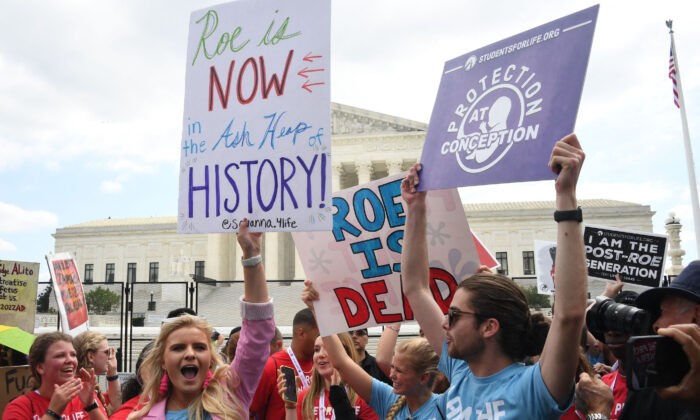 Washington DC, June 24.– The high court sided with Mississippi on Friday in a case concerning its ban on abortion beyond 15 weeks of pregnancy. With the ruling, the court overturned the nearly half-century old precedent that established a right to an abortion up until a fetus can survive outside of the womb.
Washington DC, June 24.– The high court sided with Mississippi on Friday in a case concerning its ban on abortion beyond 15 weeks of pregnancy. With the ruling, the court overturned the nearly half-century old precedent that established a right to an abortion up until a fetus can survive outside of the womb.
“We hold that Roe and Casey must be overruled,” Justice Alito wrote in the majority opinion.
The justices held that “the Constitution does not confer a right to abortion” despite the high court holding for nearly 50 years –at times reaffirming– that the unenumerated right exists. What’s more, it argued that although some rights not mentioned in the Constitution have been guaranteed, they  must be “deeply rooted in the nation’s history and tradition.” Abortion, the court held, is not.
must be “deeply rooted in the nation’s history and tradition.” Abortion, the court held, is not.
“It is time to heed the Constitution and return the issue of abortion to the people’s elected representative,” Alito wrote.
The blockbuster decision in Dobbs v. Jackson Women's Health Organization comes more than a month after a draft Supreme Court opinion was leaked, which showed that the high court was poised to overturn Roe. Long the white whale of conservative activism, the move
|
Excerpts from the Supreme Court Decision on Roe v. Wade The Court’s decisions have held that the Due Process Clause protects two categories of substantive rights—those rights guaranteed by the first eight Amendments to the Constitution and those rights deemed fundamental that are not mentioned anywhere in the Constitution. In deciding whether a right falls into either of these categories, the question is whether the right is “deeply rooted in [our] history and tradition” and whether it is essential to this Nation’s “scheme of ordered liberty.” ... the Court has been “reluctant” to recognize rights that are not mentioned in the Constitution. Collins v. Harker Heights, 503 U. S. 115, 125. Guided by the history and tradition that map the essential components of the Nation’s concept of ordered liberty, the Court finds the Fourteenth Amendment clearly does not protect the right to an abortion. Until the latter part of the 20th century, there was no support in American law for a constitutional right to obtain an abortion. No state constitutional provision had recognized such a right. Until a few years before Roe, no federal or state court had recognized such a right. Nor had any scholarly treatise. Indeed, abortion had long been a crime in every single State. At common law, abortion was criminal in at least some stages of pregnancy and was regarded as unlawful and could have very serious consequences at all stages. American law followed the common law until a wave of statutory restrictions in the 1800s expanded criminal liability for abortions. By the time the Fourteenth Amendment was adopted, three-quarters of the States had made abortion a crime at any stage of pregnancy. This consensus endured until the day Roe was decided. Roe either ignored or misstated this history, and Casey declined to reconsider Roe’s faulty historical analysis. Respondents’ argument that this history does not matter flies in the face of the standard the Court has applied in determining whether an asserted right that is nowhere mentioned in the Constitution is nevertheless protected by the Fourteenth Amendment. The Solicitor General repeats Roe’s claim that it is “doubtful . . . abortion was ever firmly established as a common-law crime even with respect to the destruction of a quick fetus,” 410 U. S., at 136, but the great common-law authorities —Bracton, Coke, Hale, and Blackstone— all wrote that a post-quickening abortion was a crime. Moreover, many authorities asserted that even a pre-quickening abortion was “unlawful” and that, as a result, an abortionist was guilty of murder if the woman died from the attempt. |
prompted celebration among those opposed to abortion, while those in support of abortion access have rallied against what they have called a deterioration of their rights.
(...)
[ Full text ]
Comments powered by CComment